|
Printables |
PowerPoints |
Online exercises |
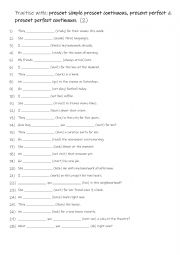
|
A2+-B1 Practise with present simple, present continuous, present perfect & present perfect continuous 2
Learning and practicing the present simple, present continuous, present perfect, and present perfect continuous tenses is essential for clear communication in English. These tenses help students to express actions and events in different time frames�whether they are habitual, happening now, or linked to the past. Mastering these tenses improves acc...
Level: elementary
Age: 9-100
Type:
Downloads: 112
|
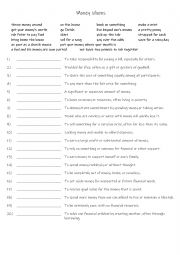
|
B1+-C1 Money idioms
First, students need to familiarise themselves with the 20 idioms and expressions and their meanings. Then they read the definitions to see which one is being described and write that word in the space provided Answers on page 2.
Level: intermediate
Age: 12-100
Type:
Downloads: 111
|
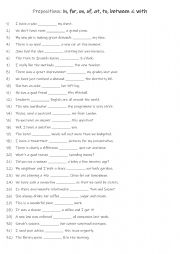
|
A2-B1 Prepositions in, for, on, of, at, to, between & with
Students read the sentences , then complete the gap-fill with a suitable preposition. Answers on page 2
Level: elementary
Age: 8-100
Type:
Downloads: 108
|
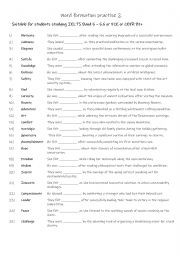
|
B1+ Word formation practise 2
Understanding word formation rules helps students build their vocabulary more effectively. By recognising prefixes, suffixes, and root words, students can decipher the meanings of unfamiliar words they encounter in texts or conversations.Suitable for students studying IELTS Band 5 � 5.5 or FCE or CEFR B1+.Answers on page 2.
Level: intermediate
Age: 12-100
Type:
Downloads: 107
|
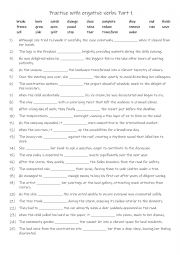
|
B1+-B2 Practise with 25 ergative verbs Part 1
Learning ergative verbs is valuable because it enhances understanding of how English communicates both active and passive meanings without altering verb forms. Ergative verbs make it easier to switch between active and passive-like constructions. For example, "The ice melted" and "They melted the ice" show how an action can be described from differ...
Level: intermediate
Age: 10-100
Type:
Downloads: 113
|
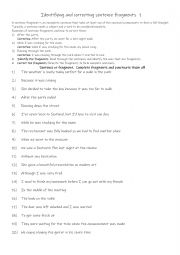
|
Identifying and correcting sentence fragments 1
First, students need to familiarise themselves with identifying and correcting sentence fragments. Then they read the sentences to identify and correct the issue and punctuate all of the sentences Answers on page 2
Level: elementary
Age: 9-100
Type:
Downloads: 105
|
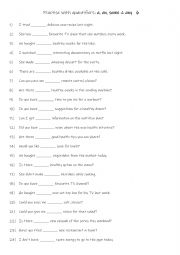
|
A1-A2 Practise with quantifiers a , an , some & any 6
Mastering these basics is essential for both everyday communication and more advanced language use, as these quantifiers are frequently used in real-life scenarios like offering, requesting, or describing items. First, students need to familiarise themselves with 4 quantifiers and check their meaning and use. Then they read the sentences to see whi...
Level: elementary
Age: 7-100
Type:
Downloads: 118
|
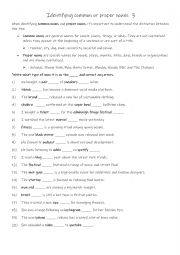
|
Identifying common or proper nouns 3
First, students need to familiarise themselves with the 2 types of nouns. Then they read the sentences to identify and use the correct punctuation for all of the sentences. Answers on page 2
Level: elementary
Age: 8-100
Type:
Downloads: 111
|
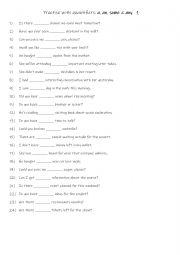
|
A1-A2 Practise with quantifiers a , an , some & any 1
Practising quantifiers such as a, an, some and any is crucial for helping students communicate effectively in English. These quantifiers are used to indicate amounts, differentiate between countable and uncountable nouns, and express affirmative, negative, or interrogative contexts. Understanding their proper usage not only enhances grammatical acc...
Level: elementary
Age: 8-100
Type:
Downloads: 116
|
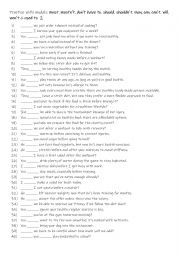
|
A1+-A2 Practise with modals must, mustn�t, don�t have to, should, shouldn�t, may, can, can�t, will, won�t & used to 2
First, students need to familiarise themselves with the modals and their use. Then they read the sentences to see which one is needed to complete the sentence. Answers on page 2.
Level: elementary
Age: 8-100
Type:
Downloads: 115
|
|
|
|
|












